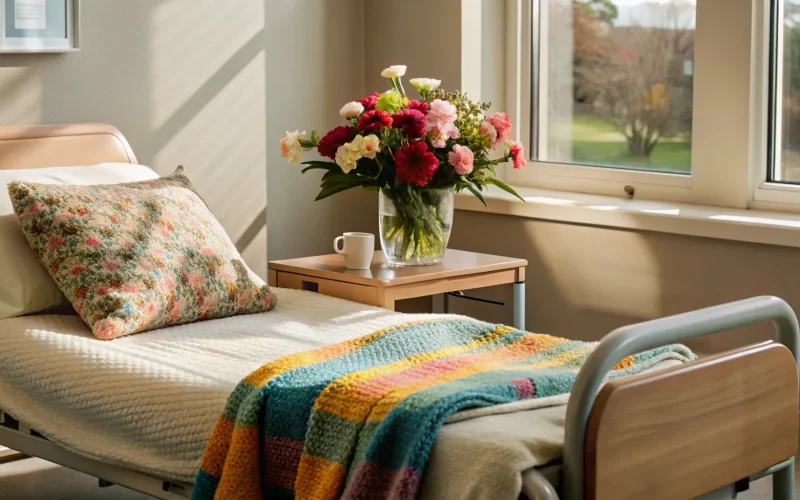When you're caring for someone with testicular cancer, life becomes a whirlwind of appointments, treatments, and endless responsibilities. Amidst this chaos, well-meaning advice from friends and family can feel overwhelming rather than helpful. For many caregivers, choosing isolation isn't about shutting people out—it's about finding space to breathe and prioritize what's truly important.
Key Takeaways
- Caregiver Isolation as a Choice: Isolation isn't about shutting others out; it's a strategy to manage overwhelming responsibilities and find space to prioritize essential tasks.
- Impact of Social Pressure: Well-meaning advice from friends and family can add stress, making it crucial for caregivers to communicate their needs and set boundaries.
- Balancing Isolation and Social Interaction: Caregivers should find ways to integrate social time with daily tasks, redefine interactions, and utilize community resources for support.
Understanding Caregiver Isolation
Caregiver isolation is a complex and often misunderstood experience. It involves caregivers intentionally withdrawing from social interactions to focus on their overwhelming responsibilities. This decision is not about shutting people out, but rather an attempt to manage the intense pressure that comes with caregiving.
The Reality of Caregiving
Caregivers face a multitude of daily challenges that can be both physically and emotionally draining. Time constraints are a significant issue; balancing medical appointments, household duties, and possibly even a full-time job leaves little room for personal time. Emotional stress is another constant companion for caregivers, as they juggle the well-being of their loved one with their own mental health. The weight of these responsibilities can lead to chronic physical and emotional stress, sleep deprivation, and a feeling of being perpetually overwhelmed (source).
Why Isolation Might Seem Appealing
Given these challenges, isolation might seem like a necessary step for some caregivers. By choosing to isolate themselves from social activities, caregivers can focus on essential tasks without the added pressure of social obligations. This self-imposed solitude allows them to prioritize what truly matters: the care of their loved one and maintaining some semblance of order in their lives (source).
The Impact of Social Pressure on Caregivers
Social expectations can add another layer of stress for caregivers. Friends and family often mean well when they offer advice or suggest social outings as a form of support. However, these gestures can sometimes feel more burdensome than helpful.
The Well-Meaning Friends and Family
Friends and family usually want to help but may not fully understand the caregiver's needs or limitations. Their suggestions may include taking breaks or enjoying leisure activities, which sound appealing but are not always practical or possible for someone who is already stretched thin (source). The disconnect between what is offered and what is needed can lead to frustration on both sides.
The Guilt of Saying No
Saying no to social invitations or offers of help often comes with a heavy dose of guilt for caregivers. They might worry about disappointing others or fear being perceived as ungrateful or antisocial. Yet, declining such offers might be crucial for preserving their mental health and managing their time effectively (source).
When Isolation Can Be Beneficial
In some scenarios, choosing isolation strategically can help caregivers manage their responsibilities more effectively.
Prioritizing Tasks
By focusing solely on essential tasks, caregivers can reduce stress significantly. This concentrated approach allows them to allocate their limited energy toward activities that directly impact the well-being of their loved one and themselves (source).
Creating a Personal Space
Having time alone is vital for caregivers to recharge mentally and emotionally. Creating personal space means setting aside moments where they can reflect without external pressures—whether it's enjoying a quiet cup of coffee in the morning or taking a brief walk outside (source). Such practices are crucial in maintaining balance amid caregiving demands.
Strategies for Balancing Isolation and Social Interaction
Finding the balance between isolation and social interaction can be a delicate dance for caregivers. Here are some strategies to help you manage both effectively.
Communicate Your Needs
One of the most important steps in balancing isolation and social interaction is clear communication. Caregivers often feel overwhelmed because others don't understand their needs. It's crucial to express how others can help you in ways that are truly beneficial. According to the Illinois Extension, maintaining open communication is vital in caregiving situations. Let your friends and family know what kind of support you need, whether it's help with household chores or simply understanding when you need space.
Redefine Social Interactions
Social interactions don't always have to mean going out for coffee or dinner. You can redefine these moments by integrating them into your daily tasks. For instance, invite a friend over while you're cooking meals or folding laundry. It allows you to catch up while still ticking off items from your to-do list. This approach not only helps maintain connections but also makes mundane tasks more enjoyable.
Set Boundaries
Setting boundaries is essential for protecting your time and energy as a caregiver. Learning to say "no" without guilt is crucial, as it helps maintain a sense of balance over your caregiving duties. According to Sustainable Caregiving, boundaries protect your time, emotions, energy, compassion reserves, and values. Be clear about what you're comfortable with, and don't hesitate to communicate these boundaries with others.
Practical Support for Caregivers
Beyond balancing social interactions, practical support is key in managing caregiving responsibilities efficiently.
Accepting Help
Accepting help can be challenging for caregivers who are used to handling everything themselves. However, allowing others to assist can significantly alleviate stress and free up time for self-care. The DailyCaring website suggests practical tips like accepting offers from friends who want to run errands or cook meals for you.
Utilizing Community Resources
There are numerous community resources available that provide much-needed support for caregivers. Organizations like the Family Caregiver Alliance offer guides on local services such as adult day care, transportation assistance, and respite care programs that give caregivers a break while ensuring their loved ones are cared for.
Encouragement for Caregivers
Finally, it's important to recognize the immense value of the work caregivers do every day.
Acknowledge Your Efforts
As a caregiver, it's easy to overlook your own efforts amidst daily challenges. Remember that your hard work does not go unnoticed; it makes a significant difference in the lives of those you care for.
Finding Your Balance
Caregiving is an ongoing journey that requires constant adjustment and self-awareness. Finding a balance that works uniquely for you—without succumbing to external pressures—is essential for long-term well-being. Embrace this journey with confidence knowing there’s no one-size-fits-all solution; what matters most is finding what feels right personally at any given moment along this path together towards healing both physically & emotionally!
Embracing Your Caregiving Journey
Caregiving is a profoundly personal experience that demands resilience, adaptability, and immense strength. While the path may be fraught with challenges, it's also filled with opportunities for personal growth and deeper connections. By recognizing when isolation serves your needs and when to open up to social support, you can find a balance that nurtures both you and your loved ones. Remember, it's okay to set boundaries and communicate your needs clearly—doing so not only protects your well-being but also enhances the quality of care you provide. Lean on the resources available to you, whether through community programs or the support of understanding friends and family. Most importantly, take pride in the vital role you play as a caregiver. Your dedication makes a world of difference in the lives of those you love, and as part of this community, you're never truly alone on this journey.
Related Articles
- Caring for Someone with Testicular Cancer: Managing Emotional Overwhelm
- A Source of Strength Amid the Struggle: Lexee Carey’s Caregiver Story
- Staying Mentally Strong During Testicular Cancer Treatment
- Starting High Dose Chemo: What to Expect and How to Prepare
Frequently Asked Questions
Why do some caregivers choose isolation?
Caregivers may choose isolation as a way to manage the overwhelming responsibilities they face. By withdrawing from social interactions, they can prioritize essential tasks and create space for themselves to focus on the care of their loved one.
How can well-meaning advice from friends and family add stress to caregivers?
While friends and family often have good intentions, their suggestions may not align with the caregiver's immediate needs or limitations. This disconnect can make caregivers feel pressured to engage in activities that aren't feasible, adding stress rather than alleviating it.
Is it okay for caregivers to say no to social invitations?
Yes, it's perfectly okay for caregivers to say no. Declining invitations is sometimes necessary for preserving mental health and managing time effectively. Caregivers should prioritize their well-being without feeling guilty about setting boundaries.
What are some strategies caregivers can use to balance isolation and social interaction?
Caregivers can communicate their needs clearly, redefine social interactions by combining them with daily tasks, and set firm boundaries to protect their time and energy. These strategies help maintain connections while ensuring personal space is respected.
How can caregivers seek practical support while managing their responsibilities?
Caregivers should be open to accepting help in forms that are genuinely useful, such as friends assisting with chores or errands. Additionally, utilizing community resources like respite care programs or transportation assistance can provide significant relief.





